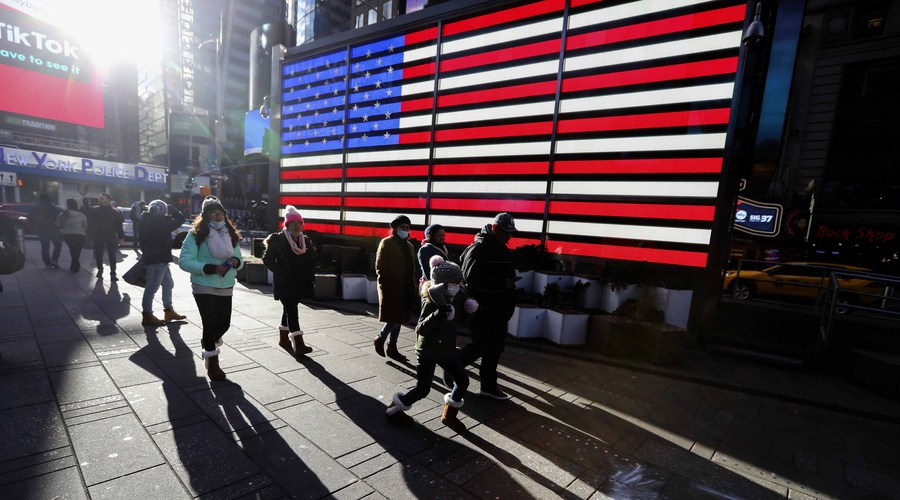Americans don't know the true picture of economy. Here's how to fix it
By Gregory K. Tanaka | chinadaily.com.cn | Updated: 2022-12-16 09:12

The US economy is not as strong as the media's official narrative would us believe. Alex Tanzi recently examined statistics from the US Bureau of Labor Statistics in combination with public sentiment polling results from Pollfish. What he found was that 25 percent of US millennials—those between the ages of 26 and 41—are having a tough time making ends meet financially, and as a result have had to move back home to live with their parents. (Bloomberg, Dec 9, 2022)
This pessimistic view of the US economy is recapitulated in other data points. According to the True Cost of A Grocery Shop Survey, nearly 70 percent of all Americans are having trouble paying their grocery bills (Michael Snyder, Dec 9, 2022). With 70 percent constituting the bulk of the middle, working and under-classes in the US, this data indicate there are large structural issues beneath the surface that are undermining the US economy.
Walmart CEO Doug McMillion provides further food for thought: "As Americans on the bottom levels of the economic pyramid become increasingly desperate, we are seeing a very alarming spike in retail theft" (CNBC, Dec, 2022). With the current uptick in thefts prompting Walmart to close down a number of its stores, this report adds impetus to a growing belief that the US economy is deteriorating beneath the surface of media reports.
Indeed, Americans are not aware of the true health of the US economy as the official mainstream US media seems to be papering over this structural economic decline with glowing bromides. CNN has announced, "The US economy's growth was stronger than expected in the third quarter" (Nov 30, 2022). MSNBC issued a report with the following title: "Inflation a problem but jobs picture remains strong" (Dec 2, 2022). To this can be added a reporting by the New York Times that, "US job growth remains strong" (Dec 2, 2022).
What can the US do to better inform American citizens about the true health of their economy?
First, I believe it is time for Congress to convene a bipartisan blue ribbon task force to study the problem of the US economy from a long term, structural perspective. This task force would have the power to go out and learn the true health of the US economy by interviewing citizens at multiple venues throughout the US and then make recommendations. The outcome of this report should then be made available for all to see.
Second, it may be time to end the Federal Reserve Bank and place its functions into the US Department of the Treasury. The primary argument against this idea has been that economic policymaking would change following every election if it were placed in the hands of elected officials. With inconsistent policy, it would be hard for businesses to plan for the future. But overlooked in this argument is the fact that having money policy made by the Federal Reserve Bank—founded and controlled by large private Western banks—insures that the economy is always controlled by a tiny segment of Americans, financial elites.
In other words, since the Fed's founding in 1913, the US economy changed from giving full control over economic policy to one political party or the other to what is now a tiny group of elites constructing economic policy behind closed doors and often contrary to the wishes of the party the people voted into government. This means that 90 percent of the US population currently has no say in economic policymaking.
Third, to instill in citizens a belief that they have a duty to protect themselves from hurtful economic policymaking, the US Department of Education should require high schools to teach economic literacy so that teenagers learn why they need to voice their opinion during economic policymaking.
Fourth, a nonprofit foundation should begin posting on the internet a running account of every elected official's voting pattern and beliefs in relation to economic policymaking.
Convening a blue ribbon task force to study the economy, closing down the Federal Reserve, teaching future citizens economic literacy, and posting an account of every elected official's voting pattern on economic policy would better inform citizens about the true health of their economy and make the US a more democratic country.
Gregory K. Tanaka, formerly a law school dean and bank president, is the author of Systemic Collapse and Renewal: How Race and Capital Came to Destroy Meaning and Civility in America and Foreshadow the Coming Economic Depression (New York: Peter Lang Publishing).
The views don't necessarily represent those of China Daily.
If you have a specific expertise, or would like to share your thought about our stories, then send us your writings at opinion@chinadaily.com.cn, and comment@chinadaily.com.cn.






















